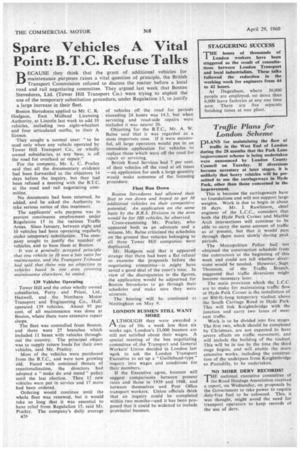Spare Vehicles A Vital Point: B.T.C. Refuse Talks
Page 32

If you've noticed an error in this article please click here to report it so we can fix it.
BECAUSE they think that the grant of additional vehicles for maintenance purposes raises a vital question of principle, the British Transport Commission refused to discuss the matter before a local road and rail negotiating committee. They argued last week that Boston Stevedores, Ltd. (Tower Hill Transport Co.) were trying to exploit the use of the temporary substitution procedure, under Regulation 15, to justify a large increase in their fleet.
Boston Stevedores applied to Mr. C. R. Hodgson, East Midland Licensing Authority, at Lincoln last week to add 10 vehicles, including two eight-wheelers and four articulated outfits, to their A licence.
They sought a normal user: "to• be used only when any vehicle operated by Tower Hill Transport Co., or wholly owned subsidiaries, at any base, is off the road for overhaul or repair."
For the company, Mr, L. C. Pratley said that all the documentary evidence had been forwarded to the objectors 14 days before the inquiry, but they had been refused a meeting with the B.T.C. at the road and rail negotiating committee, No documents had been returned, he added, and he asked the Authority to take "serious notice of this treatment.
The applicants' sole purpose was to prevent continuous employment under Regulation 15 in the various Traffic Areas. Since January, between eight and 10 vehicles had been operating -regularly under temporary substitution. The company sought to justify the number of vehicles, and to base them at Boston, It was a generally accepted principle . that one. vehicle in 10 was a fair ratio for maintenance, and the Transport Tribunal had said that there was no objection to vehicles based in one area covering maintenance elsewhere, he stated.
139 Vehicles Operating
Tower Hill and the other wholly owned subsidiaries, Perry and Priest, Ltd., Hanwell, and the Northern Motor Transport' and Engineering Co., Hull. operated 139 vehicles. About 95 per cent. of all maintenance was done at Boston, where there were extensive repair shops.
The fleet was controlled from Boston, and there were 27 branches which included 11 bases with vehicles throughout the country. The principal object was to supply return loads' for their own vehicles, said Mr. Pratley.
Most of the vehicles were purchased from the B.T.C., and were now growing old. Faced with continual threats of renationalization, the directors had adopted a "make do and mend" policy until the last election. Then 12 new vehicles were put in service and 17 more had been ordered.
Ordering would continue until the whole fleet was renewed, but it would take so long that it was essential to have relief from Regulation 15, said Mr. Pratley. The company's daily average B26 of vehicles off the road for periods exceeding 24 hours was 14.3, but when servicing and road-side repairs were included it was nearer 20.
Objecting for the B.T.C., Mr. A. W. Babe said that it was regarded as a most important case. If it were successful, all large operators would put in an immediate application for vehicles to replace those which were off the road for repair or servicing.
British Road Services had 7 per cent. of their vehicles off the road at all times —an application for such a large quantity would make nonsense of the licensing procedure.
Fleet Run Down
Boston Stevedores had allowed their fleet to run down and hoped to get 10 additional vehicles on their competitive potential. An application on the same basis by the B.R.S. Division in the area would be for 100 vehicles, he observed.
Cross-examining Mr. Pratley, who appeared both as an advocate and a witness, Mr. Balne criticized the schedules on the ground that vehicles belonging to all three Tower Hill companies were duplicated.
Mr. Hodgson said that it appeared strange that there had been a flat refusal to examine the proposals before the negotiating. committee—it might have saved a good deal of the court's time. In view of the discrepancies in the figures, the application would be adjourned for Boston Stevedores to go through their schedules and make sure they were accurate.
The hearing will be continued at Nottingham on May 9.
LONDON BUSMEN STILL WANT MORE
ALTHOUGH they were awarded a rise of 10s. a week less than six weeks• ago,• London's 33,000 busmen are still not satisfied about their wages. A special meeting of the bus negotiating committee of-the Transport and General Workers' Union decided in London last week to ask the London Transport Executive to set up a " Guillebaud-type " inquiry into wages and conditions for their members.
If the Executive agree, busmen will suggest comparisons between present rates and those in 1939 and 1948, and between themselves and Post Office transport workers. Union officials think that an inquiry could be completed within two months—and it has been proposed that it could be widened to include provincial busmen.












































































































